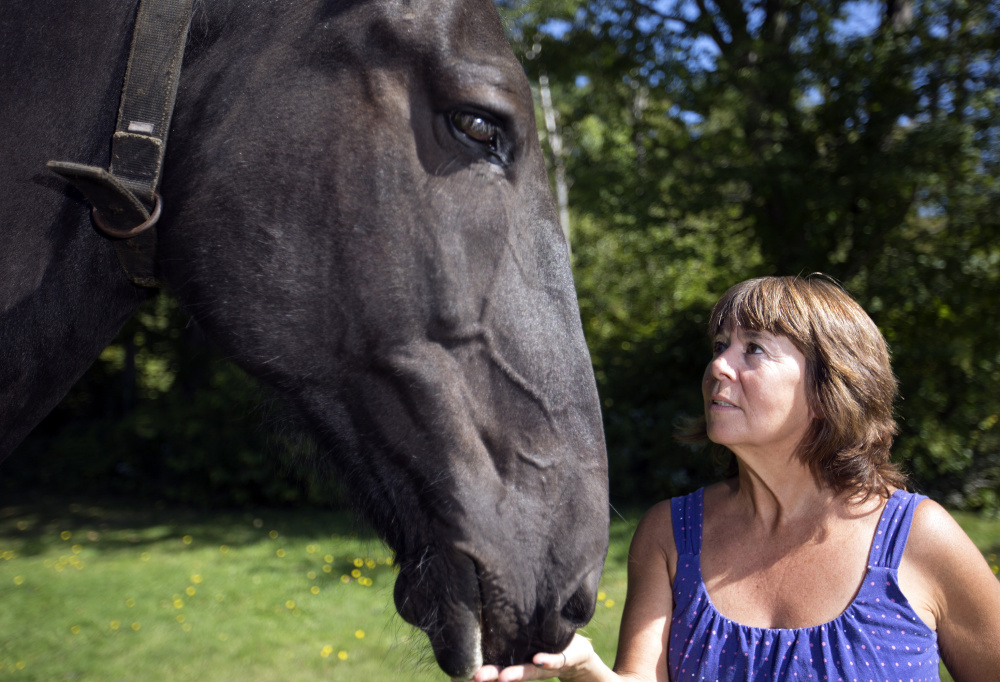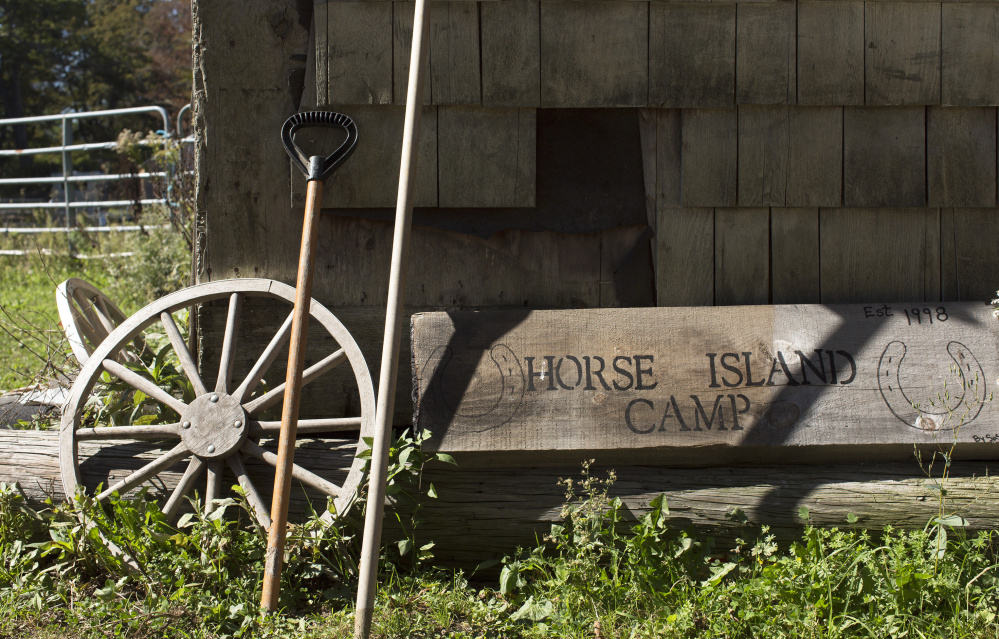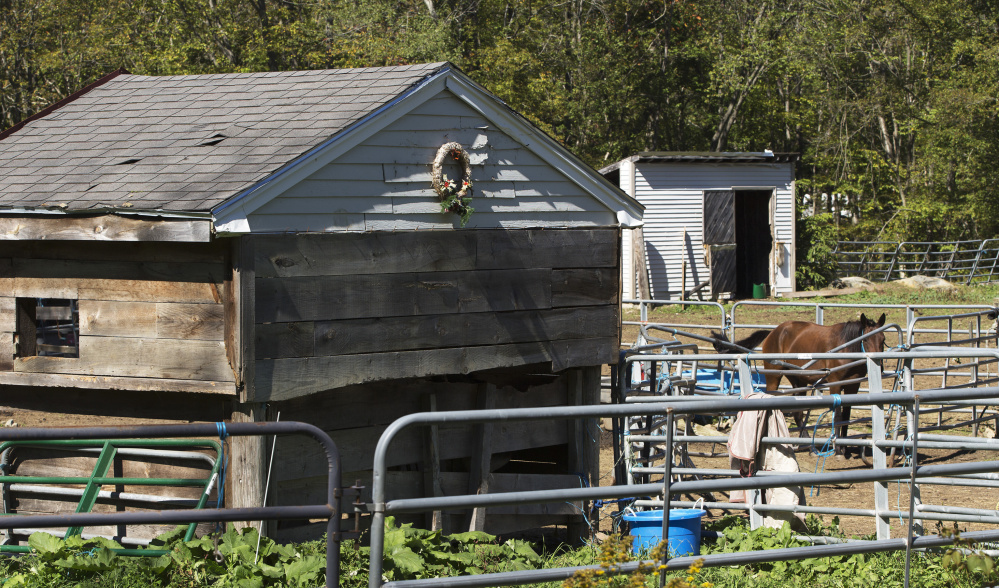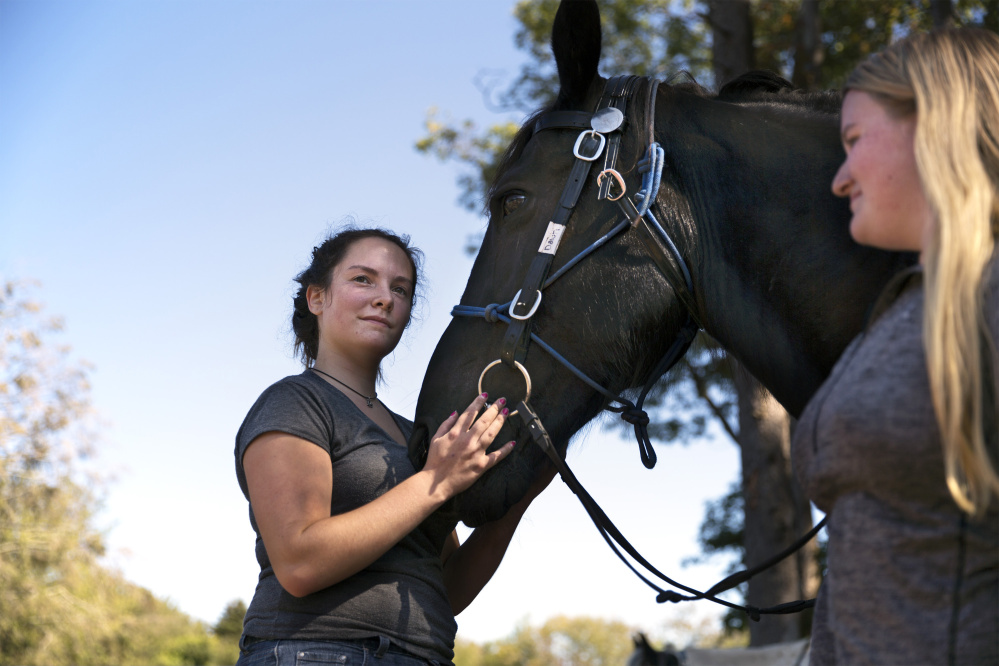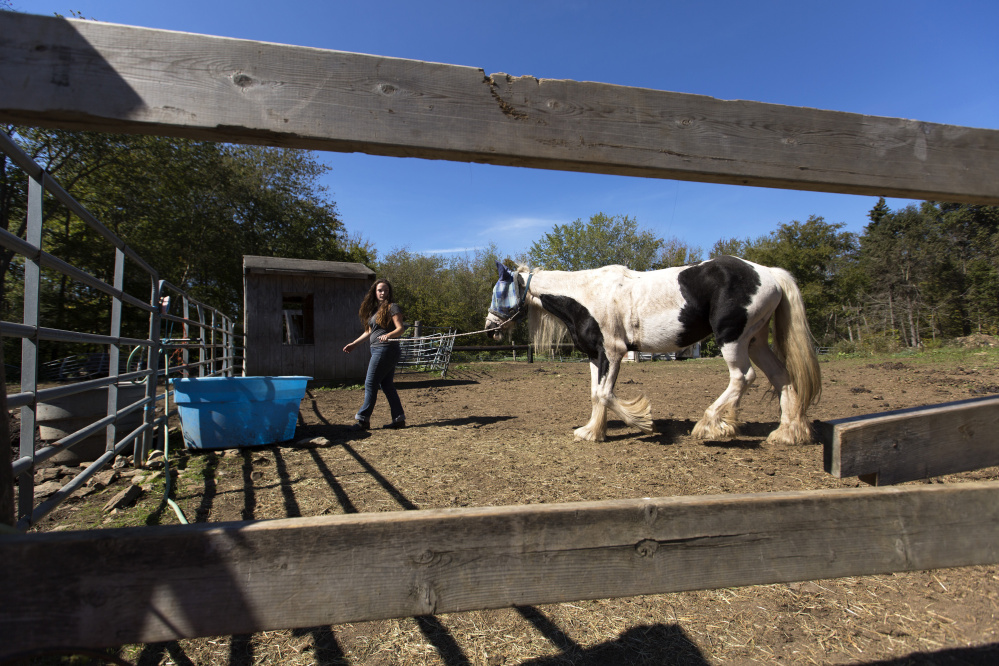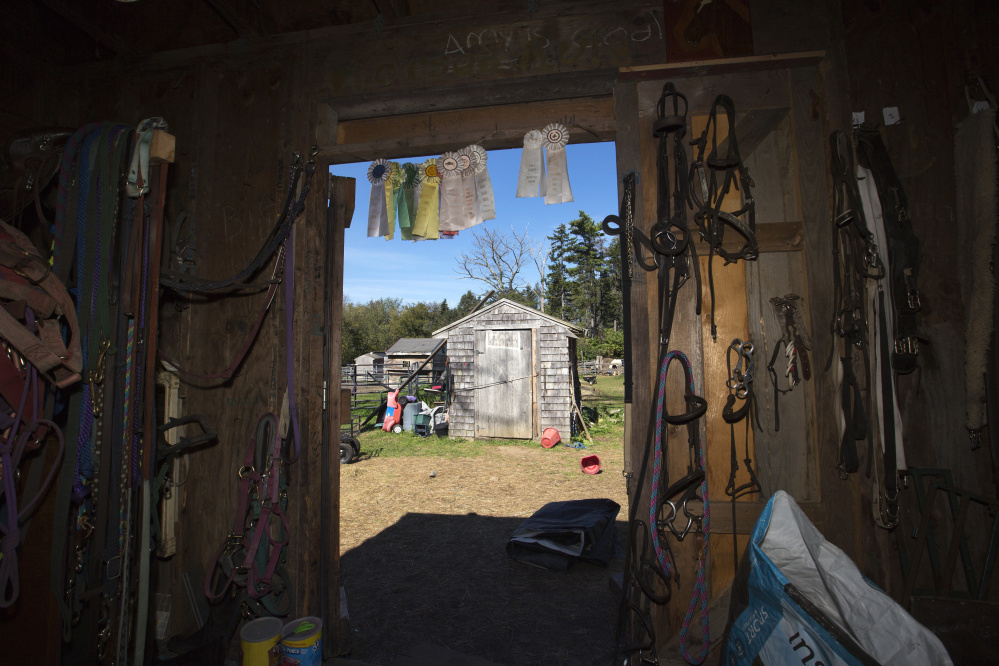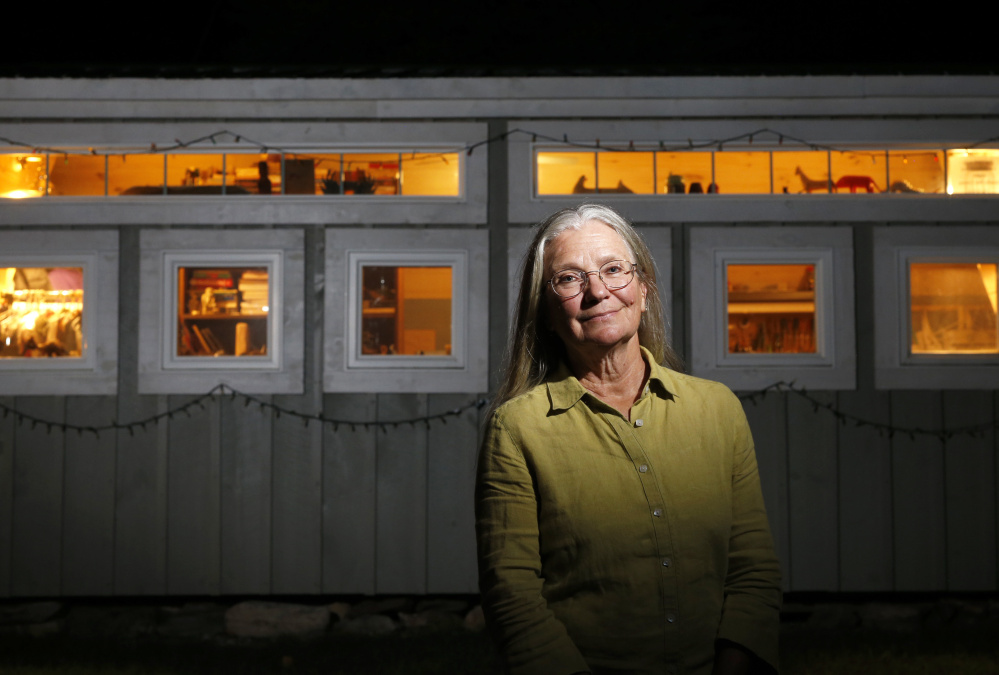Jeanann Alves has been bringing together rescue horses and disadvantaged youth on Peaks Island for nearly two decades. But an ongoing neighborhood feud involving Portland officials could force the Horse Island Camp to close.
Alves leases land from Thomas Covington Johnson, a 58-year-old lobsterman who does business as Island Bay Services. The man known as “Covey,” who has been on the island since he was a child, has clashed with his new neighbors, Rory and Timmi Sellers, since they moved in next door four years ago.
The most recent flare-up was sparked when Timmi Sellers complained about a shed being built by one of Johnson’s tenants in a city-designated wetland. A city inspection resulted in the citation of 11 unpermitted buildings, many of which belonged to Alves, and an illegal tractor-trailer used for storing hay and alfalfa for rescue horses.
Johnson appealed, but on Sept. 21 the city’s zoning board upheld the violations.
“The option is to remove the buildings or to get a permit for them,” said Ann Machado, the city zoning administrator.
Johnson said he plans to challenge in court the prohibition against having a commercial trailer on his property, and he maintains that the horse shelters do not need permits because they’re on a farm.
Without an inexpensive, convenient way to ship and store feed for the horses, Alves said the camp might have to close. If that happens, most of the horses – those that have partial blindness, cleft palates, injuries or are simply old – could meet the fate they narrowly avoided before arriving on the island: euthanization.
“I’m really stuck in the crossfire here,” said Alves, whose roots on Peaks Island date back to the late 1800s. “I have people who want to protest in front of houses, but I squashed that. Everybody’s up in arms about it and I’m trying very hard to let the dust settle.”
The conflict highlights a longstanding rift between longtime Peaks Island residents, newcomers and the city of Portland, and how change inherently collides with tradition.
“People move here from out of state and try to change the island to their liking,” said Rick Callow, a 57-year-old fisherman who has lived on Peaks since 1969. His hand was severed during a fishing accident last year, but was reattached and has healed to the point where he offers a strong handshake. “When they start to change the rules – that’s just not the way to do it.”
The island is part of Maine’s largest city, despite two previous efforts to secede. Many longtime islanders remain fiercely independent, if not defiant, scoffing at attempts from outsiders, including city officials, to change their way of life.
Timmi Sellers, who bought her home in 2013, said in an interview that she regrets that the horse camp was dragged into the dispute. However, she defended her concern about the unpermitted development of wetlands.
“I never intended to shut down the island horse camp, which is what people on the island are accusing me of,” Sellers said. “At the same time I do think the buildings are unsafe. And everyone should follow the same rules.”
Sellers also stressed the importance of following rules established by the city of Portland.
“There is still this old island mentality: ‘I can do whatever I want on my property,’ ” she said, “but we are part of the city of Portland.”
•••
On March 20, “Covey” Johnson received a notice of violation from the city’s zoning office for the unpermitted structures, most of which were movable, three-sided shelters for horses.
During the Sept. 21 Zoning Board of Appeals meeting, Johnson and his attorney Nick Bull argued that the landowner was not responsible for the unpermitted buildings, because they were built and owned by horse owners leasing his land. But he maintained they didn’t need permits because they’re on a farm, which he says is exempt from the city’s zoning. They also argued that the city does not have a permitting process in place for buildings on skids so they can be moved when land gets worn down.
“Every farm in the state has animal shelters they move around,” Johnson said in an interview. “I don’t know why they’re spending taxpayer money fighting a farm.”
So-called right-to-farm laws do protect farmers from nuisance complaints from neighbors and exempts them from some municipal ordinances. However, city officials maintain those exemptions do not include building permits, which can be issued for movable structures, even if the permit application is not set up for it.
“There are some activities that are protected by the Farm (Protection) Act, as well as the exemption from building standards … however, there is no general exemption from city regulation for farms,” City Attorney Anne Torregrossa said in an email.
It was the second time in three years that city officials were called to the island to investigate a complaint from Sellers.
In 2014, city inspectors issued Johnson a violation notice for allegedly clearing brush in wetlands, operating a commercial composting business, keeping commercial vehicles in a residential zone and using a camper as an illegal dwelling unit.
The Zoning Board of Appeals overruled all of the violations, except for the commercial vehicles, based largely on the fact that Johnson was operating a farm, a use controlled by the Farmland Protection Act.
Former Zoning Administrator Marge Schmuckal wrote at the time that Johnson had received permission from the city in 1988 to raise and keep domestic animals. She said she was “not aware of the broad reaching effect” of the Farmland Protection Act when the citations were issued.
“Apparently the Farmland Protection Act also applies to and supersedes the shoreland zone regulations,” she wrote.
Schmuckal also conceded that using commercial vehicles to service the farm could also be covered by the Farmland Protection Act, even though it was not permitted by the city’s zoning code.
“Only commercial vehicles used for the applicant’s on-premise farmland agriculture uses could be covered by state law,” she wrote.
•••
Last month, the Zoning Board of Appeals voted to uphold the city order that Johnson remove a tractor-trailer container that is used to import and store hay and alfalfa for the horses, as well as get permits for or remove the horse shelters. The decision came after a heated public hearing that caused Johnson to abruptly leave.
Johnson was clearly frustrated about having to defend his farming activities again before the board. He said that his property is a registered farm and not subject to the city’s zoning rules. He noted that the horse shelters were not a problem when the city inspected the property in 2014.
“I feel like I resolved this three and half years ago, and here we are again,” Johnson told the board.
Johnson said his farm is registered with the state and federal governments, which require that he produce at least $2,000 worth of product a year. That product, he said in an interview, has ranged from manure, to firewood, to vegetables, to livestock such as chickens, pigs and turkeys. He said he files reports every few years to maintain that status.
Separately, city officials confirmed to the Maine Sunday Telegram that the property has been receiving a special tax benefit for farmland since 1992. However, the newspaper was unable to confirm that his farm was registered.
During the appeals board hearing, Timmi Sellers argued that Johnson’s was not a registered farm, citing the city’s new Comprehensive Plan. “The city of Portland says there are no farms in Portland,” she said.
Officials at the Maine Department of Agriculture, Conservation and Forestry said they have offered to help mediate the dispute.
“No one has accepted our offer to date,” said John Bott, the department’s communications director. “We are not offering an opinion on the local control issue and we have never been to the site.”
Complicating these zoning matters appears to be a hostile relationship between Johnson and the Sellers family.
•••
Rory and Timmi Sellers, computer programmer and registered nurse, respectively, bought their home in May 2013, according to city tax records. Within a few months, Timmi Sellers had a confrontation with Johnson, who has lived there for 40 years, as they walked their shared property line.
According to court documents, Johnson was charged with disorderly conduct for allegedly “brandishing a machete” at Sellers and making offensive comments and gestures. The charge was dismissed in court.
The following year, Sellers complained to the city about the clearing of wetlands. Schmuckal, the zoning administrator at the time, noted the personal conflict in a memo to the board. “I have no comment regarding the ongoing disputes between the abutters,” she said.
Sellers currently has a restraining order against Johnson. In court documents, Sellers said she received a text message from Johnson at 5:34 a.m. on Sept. 23 – two days after the heated city meeting – saying: “your (sic) no friend of Peaks Island the island will turn on you wait and see have a wonderful time it should be fun.” She also noted that her golf cart had been vandalized on the night of the appeals board meeting. Her husband believes someone doused it with fox urine, a liquid with a pungent odor that can be purchased and used to repel deer and other pests.
A hearing on the order is scheduled for Oct. 23, but Sellers is seeking a delay since she will be out of town.
During last month’s zoning meeting, Bull, Johnson’s attorney, accused Sellers of “trying to whipsaw Mr. Johnson and his corporation by using the municipal offices of the city of Portland.” He said the real issue was a right of way that passed by the Sellerses’ home, which has wood and stone sculptures as well as several sheds, that was used by Johnson’s tenants to receive hay deliveries.
Rory Sellers disputed that claim and described Johnson’s comments as slander and libel. A clearly frustrated Johnson abruptly left the meeting, telling Sellers that, because of ongoing legal fees, “I can’t afford to put my daughter through college because of you and your wife.”
Johnson said he’s so frustrated that he’s willing to sell his 25 to 30 acres of land, if the right offer comes along, so it can be developed into housing, just like Camelot Farm, a former agricultural property in Portland’s Stroudwater neighborhood that is slated to be turned into about 95 single-family homes.
•••
Until then, Johnson said he plans to take the city to court over its prohibition of commercial vehicles and storage containers on his property.
Alves said she is taking a wait-and-see approach, since she has been asked by Johnson not to apply for permits.
Even with permits for the horse shelters, which she admits “aren’t pretty,” Alves said she’d be unable to meet the city’s demands, since she can’t afford to build a barn large enough to store all of the hay, alfalfa and grain that is needed during the winter.
But Alves, who works full time in Portland public schools and keeps horses as a labor of love, has faith things will work out for the camp, which offers horseback riding tours throughout the island. She said her horse camp usually breaks even, but it is not a registered nonprofit.
Yet she is hesitant to accept reservations for next year at the camp, which has rescued not only injured, neglected and abandoned horses, but also kids who are trying to overcome personal tragedies, disabilities and other challenges. The camp offers hourly rides around the island, as well as mini day camps, which offer arts, crafts, hands-on horse education, and other activities.
She has faith that her animals will somehow be allowed to live out their final hours at Horse Island Camp. Alves is known in the horse owner community as offering a home for retired or injured race and draft horses, as well as other horses and donkeys whose owners can no longer care for them. Otherwise, such animals would have been euthanized.
Animals like Jerome, the donkey popular with the kids; Buster, the lazy racehorse; Black Dawn, the half-blind mare; Mr. Dumpling, the bossy mini-horse featured in a children’s book authored by Alves; Boo Bear, a former logging horse; and Mercury, who was one of the farm’s first and oldest horses.
“I just have a feeling that everything will be fine,” Alves said. “These horses have been here longer than most people on the island.”
Randy Billings can be contacted at 791-6346 or at:
rbillings@pressherald.com
Twitter: randybillings
Send questions/comments to the editors.


